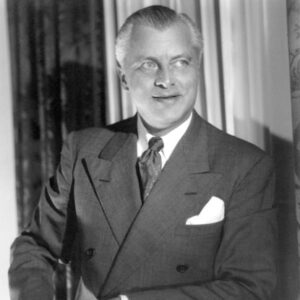calsfoundation@cals.org
Jack Carnes (1896–1958)
aka: Samuel Jacob Carnes
Samuel Jacob (Jack) Carnes was the founder and owner of Camark Pottery, one of Arkansas’s premier art pottery companies. Camark pottery has become highly valuable to collectors and is featured in museums such as the Old Statehouse Museum and the Historic Arkansas Museum in Little Rock (Pulaski County).
Jack Carnes was born on March 12, 1896, in Zanesville, Ohio, the son of John O. Carnes, a lawyer. His mother’s name is unknown. He had one sister, Hazel, and one brother, Craig. He grew up in Cambridge, Ohio, and graduated from Cambridge High School in 1915. He received his BS degree from Muskingum College in New Concord, Ohio, on June 4, 1918, and did graduate work in engineering at the Massachusetts Institute of Technology.
Carnes was commissioned in the United States Naval Reserve (USNR) as a naval aviator on June 5, 1919, shortly after World War I, but he did not serve overseas. He then moved to Houston, Texas, to pursue a career in the oil business and real estate. When oil was discovered in Smackover (Union County), he moved to Camden (Ouachita County) to go into the oil business.
On May 30, 1926, Carnes married Gressie Umsted, daughter of the well-known oilman and capitalist Sidney A. Umsted. They had one adopted son, Sidney Umsted Carnes, who died in a car wreck twenty years later.
Carnes worked as an investment broker in both the oil and real estate fields and was active in the civic affairs of Camden and other areas. He was president of both the Camden Chamber of Commerce and the Camden Rotary Club, raised funds for the Camden Hotel (a public service), contributed heavily to the War Memorial Stadium, and donated the land for Camden’s Carnes Park, where the town’s first public swimming pool was built. He was a strong supporter of the Democratic Party, both locally and nationally.
Carnes had become familiar with the manufacture of art pottery in his native Zanesville, which is considered the cradle of the American art pottery industry. He recognized that the clay deposits near Camden in the Ouachita County area of Chidester and Lester were good for making pottery. Carnes secured the support of the Camden Chamber of Commerce and local citizens, who donated land for him to build a pottery business. The Camden Art Tile & Pottery Company (later renamed Camark Pottery) was completed in 1926 and opened for business in 1927. Carnes recruited potters from Ohio to move to Camden. The group Carnes assembled produced the unique designs and the luster and iridescent treatments in the early years of Camark.
In the 1930s, Camark started mass-producing castware Camark pottery, which was shipped all over the United States, and stores were established in New York City, Chicago, and San Francisco. He was involved in every phase of the production of Camark pottery despite the fact that he continued his work in oil and real estate.
Carnes was a man of many talents and interests. In 1951, he produced a play, Hocus Pocus, in Los Angeles, California. He invented and patented a “fish caller,” a device that made a buzzing noise when it was dropped in the water to attract fish. Carnes loved music and played both the piano and organ; he composed the song “Arkansas Hello” and unsuccessfully tried to have it adopted as Arkansas’s state song.
His other interest was thoroughbred horses, and he established his own racing stable. His horse Old Story won the Junior Kentucky Derby. Carnes served on the Arkansas Racing Commission for eight years during the 1950s.
Carnes died on December 25, 1958, and is buried in the Umsted Mausoleum at Greenwood Cemetery in Camden. Camark pottery closed its doors soon thereafter in the early 1960s.
For additional information:
Gifford, David Edwin. Collector’s Guide to Camark Pottery. 2 vols. Paducah, KY: Collector Books, 1997, 1999.
Betty Becker Walt
Little Rock, Arkansas
 Business, Commerce, and Industry
Business, Commerce, and Industry Early Twentieth Century, 1901 through 1940
Early Twentieth Century, 1901 through 1940 Jack Carnes
Jack Carnes 




What a great biographical description of one of an earlier generations true Renaissance men.
Mr. Carnes, in the later part of his life, was my grandfathers business associate. In the mid-1950s, Frank Birch, a pioneer Wisconsin ad-man (the Oscar Meyer Wienermobile) and entrepreneur, bought the rights to and then perfected Mr. Carness fish callerrenaming it the Krafty Fish Caller in honor of his second wife, Roa Kraft. After forming the company BirchKraft Industrieswith proving grounds at their retirement home in the Florida Keyshe sold thousands of them until he passed away in 1973. You can still buy the Carnes-Birch fish callers when they occasionally appear on eBay.